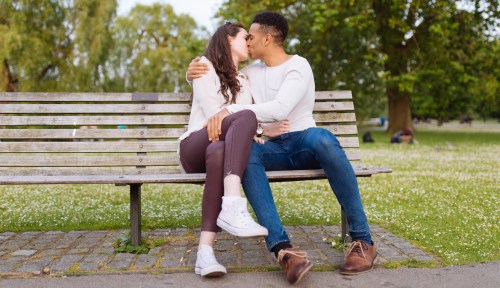Can You Get Cavities From Kissing? Here’s What a Dentist Wants You To Know
If you're wondering if you can get cavities from kissing, a dentist explains that it all comes down to the bacteria in your partner's mouth.

News I didn’t think I would hear today: Cavities are contagious, and you can “catch” one through kissing. Well, sort of. It depends largely on your partner’s dental habits (and your own).
Experts in This Article
As you may already know, poor oral hygiene can lead to bacteria, which can lead to cavities. The problem comes when that bacteria is spread. “That bacteria can be passed on to someone else when there is an exchange of saliva, like when you’re passionately kissing your partner,” says Bill Dorfman, DDS, a celebrity cosmetic dentist.
Research backs this up: A study by the University of Louisville found that mothers with cavities transmitted oral bacteria to their babies after sharing spoons or trying to clean pacifiers with their mouths.
Those aren’t the only avenues for catching cavities, either. “Sharing drinks, utensils, straws, etc. are all ways to exchange bacteria via saliva, which can lead to cavities,” Dr. Dorfman adds. And, as we know, many illnesses can be spread through saliva, too, like colds, mono, cold sores, strep, and more.
This is important to note not only because cavities can lead to further problems (and are expensive to fix), but also because they can impact other aspects of your health, too. Sam Low, DDS, MS, a past president of the American Academy of Periodontology, previously told Well+Good that “the chronic inflammatory reactions that occur with gum disease parallel what you see in other major chronic inflammatory diseases, especially cardiovascular disease, diabetes, respiratory diseases, rheumatoid arthritis, recent data with Alzheimer’s.”
The good news: This doesn’t mean you can never kiss again if you or your partner is cavity-prone. Dr. Dorfman clarifies you’re not looking at an automatic cavity if your partner has one—just an increased chance. “Just because someone has a cavity, or is developing one, doesn’t mean you will get a cavity as well,” he says. “It continues to be dependent on the state of your oral hygiene.”
Safeguard your dental health so you don’t catch cavities
So, to protect your teeth and reduce your risk of cavities, Dr. Dorfman encourages maintaining your oral hygiene routine—brushing your teeth, flossing, using mouthwash, the works—so you’re less likely to have all of that bacteria (from your own mouth or your partner’s) wreaking havoc on your teeth. Plus, some foods like apple and cinnamon even have benefits for your gums and teeth, so load up on them as part of a healthy diet.
“Another safeguard is to rinse with alcohol-free mouthwash after a kissing session to ward off any bacteria that may have been introduced into your mouth,” Dr. Dorfman adds.
In case you’re wondering, the opposite isn’t true here: You can’t improve your own oral health by kissing someone who brushes/flosses/uses mouthwash regularly. At the same time, it doesn’t hurt. According to Dr. Dorfman, kissing that person means less harmful bacteria is spread overall, which counts for something!
Sign Up for Our Daily Newsletter
Get all the latest in wellness, trends, food, fitness, beauty, and more delivered right to your inbox.
Got it, you've been added to our email list.










